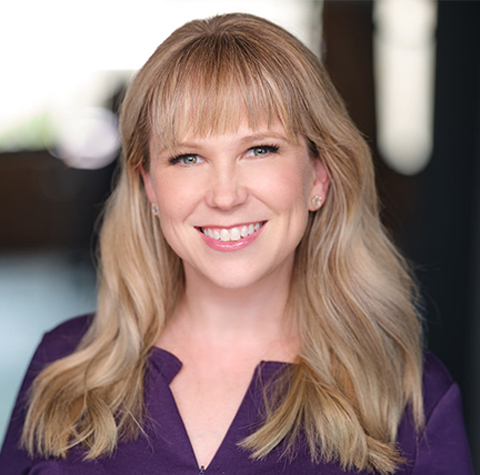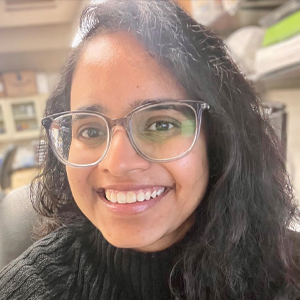
Integrating sex as an essential variable
Nicole C Woitowich’s career as a scientist and advocate has been guided by a central principle: “To be a leader means to really empower all of the people you work with.”
As a graduate student at Rosalind Franklin University of Medicine and Science, Woitowich helped develop an outreach program, Women in Scientific Discovery or Medicine, or WISDOM, to encourage young girls to pursue science careers. In 2016, she was selected for the Presidential Management Fellowship, a federal leadership program. Rather than pursuing a government role, she chose a career combining research, advocacy, policy and science communication.

During her graduate training, working on reproductive physiology and enzymology, Woitowich noticed the often-overlooked importance of sex differences, particularly the role of hormones in whole-body systems.
Reflecting on her training, she said, “I was taught to think about sex differences, so it felt natural to me. I didn’t realize others weren’t considering it.”
Woitowich is the executive director of the Northwestern University Clinical and Translational Sciences Institute and a research assistant professor in the Department of Medical Social Sciences. Her work focuses on advancing gender equity in science, emphasizing the importance of incorporating sex as a biological variable in biomedical research. She points to the lack of dedicated funding to address sex differences in research and highlights the efficiency of designing studies that consider sex as a critical variable from the outset.
“If we can design experiments to consider sex as we would time, dose, and reagents, we save time and resources by improving rigor and reproducibility,” she said.
Her commitment to interdisciplinary science is also evident in her role as executive director of a Clinical and Translational Science Award, or CTSA, hub.
“I’m not limited to one area of science,” Woitowich said. “In this role, I have the unique opportunity to engage with researchers across diverse fields, fostering collaborations that push scientific discoveries closer to real-world applications. My career allows me to support and amplify the work of others, helping to bridge gaps in knowledge and bring transformative innovations to patients and communities faster.”
She serves on the American Society for Biochemistry and Molecular Biology Finance Committee and directs the Women’s Health Access Matters, or WHAM, Research Collaborative, a nonprofit dedicated to improving women’s health research.
Woitowich is the 2025 recipient of the ASBMB Emerging Leadership Award, which honors an associate professor, assistant professor or equivalent with no more than 15 years of experience since receiving a Ph.D. and/or M.D.
Asking different questions
Beyond research, Nicole Woitowich is a science communicator. She has served as chair of the ASBMB Science Outreach and Communication Committee, where she spearheaded updates to the Art of Science Communication course.
She is also a proponent for advancing women in science and medicine and believes that a more diverse scientific workforce will lead inherently to greater attention to sex-based data.
“Women ask different research questions because they understand how certain factors affect them uniquely,” she said. “This diversity of questions, perspectives and thought improves the quality of science.”
Woitowich’s work spans a wide spectrum, from analyzing sex and gender bias in research and contributing to academic writing to serving as a university administrator and science communicator.
When asked about her career, she said, “Yes, it’s challenging, but it’s incredibly rewarding and fulfilling.”
ASBMB 2025 award winners
Read profiles of all the society’s 2025 honorees who will receive their awards and give talks at the ASBMB Annual Meeting, April 12–15 in Chicago.
From receptor research to cancer drug development: The impact of RTKs
Joseph Schlessinger receives the ASBMB Herbert Tabor Research Award.
Computational and biophysical approaches to disordered proteins
Rohit Pappu receives the DeLano Award for Computational Biosciences.
Leading the charge for gender equity
Nicole Woitowich receives the ASBMB Emerging Leadership Award.
Helping underrepresented scientists feel seen
Benjamin Garcia receives the ASBMB Ruth Kirschstein Diversity in Science Award.
Transforming learning through innovation and collaboration
Neena Grover receives the William C. Rose Award for Exemplary Contributions to Education.
Curiosity turned a dietitian into a lipid scientist
Judy Storch receives the Avanti Award in Lipids.
Elucidating how chemotherapy induces neurotoxicity
Andre Nussenzweig receives the Bert and Natalie Vallee Award.
What seems dead may not be dead
Vincent Tagliabracci receives the Earl and Thressa Stadtman Distinguished Scientist Award.
'You can't afford to be 15 years behind the parasite'
David Fidock receives the Alice and C.C. Wang Award in Molecular Parasitology.
Guiding grocery carts to shape healthy habits
Robert Helsley receives the Walter A. Shaw Young Investigator in Lipid Research Award.
Enjoy reading ASBMB Today?
Become a member to receive the print edition four times a year and the digital edition monthly.
Learn moreGet the latest from ASBMB Today
Enter your email address, and we’ll send you a weekly email with recent articles, interviews and more.
Latest in People
People highlights or most popular articles

Embrace your neurodivergence and flourish in college
This guide offers practical advice on setting yourself up for success — learn how to leverage campus resources, work with professors and embrace your strengths.

Survival tools for a neurodivergent brain in academia
Working in academia is hard, and being neurodivergent makes it harder. Here are a few tools that may help, from a Ph.D. student with ADHD.

Quieting the static: Building inclusive STEM classrooms
Christin Monroe, an assistant professor of chemistry at Landmark College, offers practical tips to help educators make their classrooms more accessible to neurodivergent scientists.

Hidden strengths of an autistic scientist
Navigating the world of scientific research as an autistic scientist comes with unique challenges —microaggressions, communication hurdles and the constant pressure to conform to social norms, postbaccalaureate student Taylor Stolberg writes.

Richard Silverman to speak at ASBMB 2025
Richard Silverman and Melissa Moore are the featured speakers at the ASBMB annual meeting to be held April 12-15 in Chicago.

Women’s History Month: Educating and inspiring generations
Through early classroom experiences, undergraduate education and advanced research training, women leaders are shaping a more inclusive and supportive scientific community.

